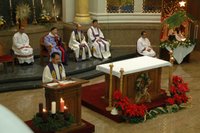Homily for the First Vows of Scholastic Honorato Salazar, S.J. by José Cecilio J. Magadia, SJ
Loyola House of Studies, Ateneo de Manila University
This afternoon, we gather to witness the ceremony of the First Vows of our friend, Atoy Salazar. If I were a celebrity journalist, I would begin a news report on this afternoon’s event by describing Atoy as being a “dashing and debonair doctor, daring to defy convention, by not shifting to nursing and finding a better job abroad.” But I am no journalist, and neither is Atoy really a celebrity --- not yet, at least – nor is he definitively dashing and debonair. So I guess, I will settle for the more modest and apt adjectives, “determined and driven,” for that he certainly is.
Some four years ago, this “determined and driven” young doctor, fresh out of medical school, thought he knew exactly what he wanted in life. But he began to be disturbed by something he could not exactly put his finger on --- a gap of sorts, an unfamiliar emptiness, a longing that refused to be satisfied so easily. It was an experience similar to what many young people go through once they reach the threshold of their ambitions, who, after all the blood and sweat and tears of pursuing a single dream, realize that it was not enough and that something else was missing.
Some young people simply ignore this feeling and pretend that it isn’t there, and they learn to live their lives contentedly, but with an incomprehensible tinge of unhappiness deep down. Others just pick up their bags and set out on a new journey in pursuit of what they thought was their star, but they followed false stars that led nowhere. And they would go off again and again, and never seem to settle down, and end up in a constant state of being without a center, without direction, without zeal. Some eventually get tired and settle for second-best. Some remain forever lost.
Then finally, there are those young people who take time to stop and face this strange and disturbing disquiet squarely, and silence themselves, and listen well to what their hearts are really whispering. They are the lucky ones, who learn early on what it was they were searching for in the first place.
Today, that young doctor who took time to listen to his heart is now just a little older, and a little more scarred, and a little less frustrated, and a little more secure, and he finds himself ready to take vows of perpetual chastity, poverty, and obedience in the Society of Jesus. Perpetual, mind you --- not part-time, not time-bound, not in installments, not in convenient and disposable sachets, but the whole caboodle, sik-sik, liglig, at umaapaw (dense and overflowing*).
This afternoon, as we accompany Atoy in this important event, I propose that we simply try to understand what these religious vows are all about.
To simplify things, one might say that the vow of poverty is about embracing simplicity and surrendering the privilege of personal possession. The vow of chastity is about loving universally and inclusively, and sacrificing the great gift of having an exclusive partner. The vow of obedience is about allowing God to take control of one’s life and being completely open to the Spirit moving in the world and moving in religious superiors, and renouncing sole control for determining one’s actions. More importantly, these vows, noble as they may seem to be, are not taken for their own sake. They are embraced so that a Christian can take on the mission completely, to give and not to count the cost, to fight and not to heed the wounds.
But no one said that it would be easy. Father John Courtney Murray, a great Jesuit theologian who taught many of our own Philippine Province men, spoke of “the danger of the vows.” With poverty, he says, we run the risk of irresponsibility, as we win a sense of security with less of a struggle, and we are freed from feeling the need to earn a living as we depend on the Order for our very existence. We become glorified free-riders. With chastity, we run the risk of pride and emotional immaturity, of having a hardness of heart because of isolation from the facts and forces of human nature, which remind us of our radical dependence on God. With obedience, we run the risk of being without drive, as we depend on superiors to make our decisions for us and lose our own sense of assertiveness, our determination, our raw energy, since we are liberated from making the hard choices that others seldom escape. And the danger of the vows has to do with becoming less of a man, and more of a wimp. Yes, Jesuit life can turn into an easy and carefree one. It can skip into sheer complacency and a desire for comfort, and even luxury.
And the only way we can save ourselves from falling into this trap is by making sure that we cling to our sense of being creatures, of being sinners, of not knowing what the future will hold and yet pushing ourselves to give more and not to hold back. We do so with great fear and trembling, and yet encouraged because we know that through the vows, we are empowered to give the world of today two great gifts--- the gift of conviction and the gift of gentleness.
First, the gift of conviction. The gift of conviction is given to the world of postmodernity, of fast-shifting changes, indeterminate futures and wavering principles. It is a world that says that objective truth is dead, that lasting values are passé, and that all we have are short-lived preferences that are always relative and always easy to give up. The vows pronounces that it is possible to say yes, in a world that has gotten used to maybe’s and we’ll-sees, that there are still absolute values that withstand the shifts in human history, and that the absolute truth is that there is a God who cares and who inserts himself into our lives in a definitive way, and invites us to a profound unity, and so become less selfish, less greedy, and less controlling and become the shining and burning lamp that John the Baptist is in today’s Gospel, as a pointer to the one true light, Jesus the Christ. And that is our conviction.
But there is a second gift --- the gift of gentleness. The gift of gentleness is given to the world of efficiency and managerial precision. It is a world with clear benchmarks of success, measured in terms of outputs and income and quality, that insist on making everything fit in into packaged plans and well-prepared schemes. The vows tell such a world that it is still possible to relax and take it easy, and have faith in a God who sees more than we will ever see, who invites and never imposes, who can wait even if we dilly-dally and waver and allow our fears and anxieties to get the better of us sometimes. The vows tell the world that chastity and poverty and obedience are not about what we cannot do, but about what more we are willing to do, because of the great gifts we have received in such overflow. And so, we can afford to be gentle on ourselves and on others.
Atoy, these are your gifts to the world as you make these vows, and as you do so, you are likewise given a gift. And your gift is this --- it is the promise that as you share this conviction and this gentleness to the world, you will not be alone. You will be joined by this group of crazy men, some 20,000 of us worldwide, some young, some not-so-young, some clowns, some scholars, some authentic saints, some self-made neurotics, many intelligent and talented in very different ways, yet also hard-headed and opinionated, with different intensities of creativity, offering you respect and companionship, yet also unafraid to challenge you and push you to your limits. Most of us are sane, yet clearly all wacky of sorts, because we share a dream bigger than ourselves. All stumbling through in our daily works, some failing miserably, others even foolishly. Many of us gamblers and risk-takers, all sinners yet knowing that we are deeply loved by Christ and called to dedicated service to His mission. Atoy, when you look at the men you are given as companions in the least Society of Jesus, you might very well be tempted to go for the nagging wife, but that might not be as exciting for your taste. But do look again, and maybe, you will see that these men will inspire you and they will show you flashes of the very gifts that that young doctor was looking for, four years ago.
But most of all, Atoy, you are gifted with the promise of the presence of the Lord of the banquet, Himself, who is always Emmanuel, God-with-us, God who will never ever abandon us.
My prayer for you, Atoy, is that as you fumble through your Jesuit life, with the rest of us, fumblers, you hang on to the spirit of Father Ignatius’ ad majorem Dei gloriam, the greater glory of God. At a meeting in Hong Kong some months ago, Father Beda, the Chinese Provincial explained to us the Chinese characters of AMDG, and the Chinese character of majorem or greater, incorporates the character for heart, and that the image literally means “to go beyond the heart.” That is our prayer for you on your vow day, that you might never stop giving so generously, to the point of going beyond the heart.
* own translation from Filipino.



2 comments:
FELICES PASCUA!
thank you fr.jboy!this is so timely for me...
i am so touched!
this entry reassured me of my vocation and the commitment that i made last april. nope not with the jesuits! heheh but with the a catholic lay association.
indeed it is all grace...
Post a Comment